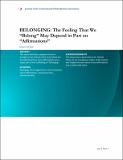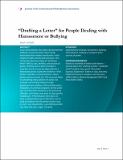04. Micro-inequities (including Micro-aggressions) and Micro-affirmations
This publication list includes many accounts of apparently tiny events that can have a major impact for harm—or for good. Several articles describe the minutiae of discrimination, micro-inequities that are part of—and maintain—structural sexism and racism and other forms of discrimination. Subtle discrimination is part of the scaffolding of persistent inequality. (At first, micro-inequities were nicknamed “Saturn’s Rings phenomena,” because the planet Saturn is obscured by rings—although if you were in a ring, you might only feel pings from bits of sand and ice.)
The reverse is also true: Micro-affirmations form part of the scaffolding that supports people to thrive. The power of micro-affirmations is only beginning to be studied and understood. The articles on this page offer an account of where these two terms came from, and include:
- An extension of Professor Chester Pierce’s original work on racist micro-aggressions, to add in a wider set of all micro-behaviors whose effects are perceived as unfair whether or not “aggressive.” This wider of set of micro-behaviors includes events resulting from unconscious bias, negligence, thoughtlessness, lack of skills or knowledge, and accidents, as well as those that are hostile or aggressive. This wider set, including micro-aggressions, was named micro-inequities.
- Discussion of the fact that while micro-messages affect everyone, they may have disparate impact on people who are perceived as non-traditional or less powerful in a specific environment. The original definition of micro-inequities was: “apparently small events which are often ephemeral and hard-to-prove, events which are covert, often unintentional, frequently unrecognized by the perpetrator, which occur wherever people are perceived to be ‘different.’” The discussions were later expanded to include a yet-wider set of micro-events whose effects are perceived to be unfair.
- The ways that micro-affirmations may help to block unconscious bias, and in many ways address the structural nature of racism, sexism, and other forms of discrimination and unfairness. The original definition of micro-affirmations was “apparently small acts, which are often ephemeral and hard-to-see, events that are public and private, often unconscious but very effective, which occur wherever people wish to help others to succeed.” Affirmations may be fundamental to our experience of “belonging.” Micro-affirmations also need a research agenda.
Collections in this community
Recent Submissions
-
Micro-Affirmations Are Joining the Social Science Research Agenda
(MIT Sloan School of Management website, 2024-12) -
BELONGING—The Feeling That We ‘Belong’ May Depend in Part on ‘Affirmations'
(Journal of the International Ombudsman Association, 2023)This essay describes a poignant concern brought to the ombuds office that helped me to understand how micro-affirmations are a major part of the scaffolding of “belonging.” -
“'Drafting a Letter' for People Dealing with Harassment or Bullying"
(Journal of the International Ombudsman Association, 2023)As an early ombuds, the author discovered that drafting a structured letter about being mistreated often helped constituents—with respect to both process and outcomes. This article describes the origins of “drafting a ...


